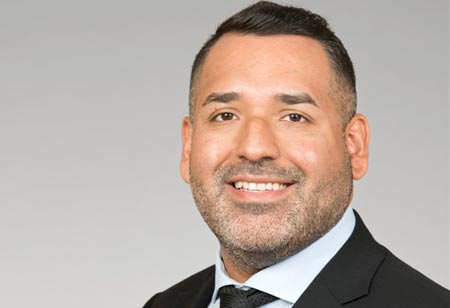Thank you for Subscribing to Healthcare Business Review Weekly Brief

Staffing, Diversity, and Inclusion: Keys to Operational Success in Healthcare
Healthcare Business Review
Christian is a solution-oriented professional with hands-on experience in leading key operational initiatives across various environments, including healthcare, occupational therapy, and rehabilitation fields. He plays a vital role in building and retaining highly efficient teams through adept people management and emotional intelligence, fostering a work culture of diversity, inclusion, equity, and continuous development.
Please tell us about your roles and responsibilities at Hartford HealthCare in managing various operational environments.
I’ve gained diverse experience across various healthcare settings throughout my career, including skilled nursing, hospital environments, and inpatient rehab units. As a clinician, I’ve personally navigated the challenges inherent in different facets of healthcare rehabilitation, providing me with an intimate understanding of the day-to-day struggles clinicians encounter while striving to attain various clinical outcomes. In my current role as a Director, I manage operations in both outpatient and hospital-based inpatient rehab units, which adds another layer of complexity and diversity to my professional portfolio.
When considering the tasks that therapists in acute care, inpatient rehab units, and outpatient clinical settings need to undertake, I recognize that the challenges they face are distinct. To effectively support them, it’s crucial for me to engage in ongoing conversations with clinicians, seeking their insights into the current obstacles they confront and understanding what hinders them from achieving desired outcomes with their patients. One key aspect involves conducting thorough root cause analyses to uncover the underlying issues such as lack of necessary equipment, time constraints, or difficulties in comprehending processes.
Once we pinpoint the actual root cause of a problem, our focus shifts towards developing solutions and countermeasures. The key to this process lies in fostering a culture where team’s feedback is perceived as a valuable gift within the clinic space. It’s crucial for team members to feel at ease expressing any obstacles hindering their goals directly to their supervisor or to me. This openness facilitates the sharing of ideas aimed at improving processes and creates an environment where everyone, regardless of their position, feels empowered to contribute thoughts to enhance efficiency.
What are Some of The Major Challenges Existing Today iIn Rehabilitation or Outpatient Therapy?
I manage a team of occupational therapists, physical therapists, and speech therapists. Our current industry challenges primarily stem from regulatory hurdles and insurance constraints. Clinicians are now forced to consider whether insurance providers will allocate sufficient time for us to address all the necessary aspects of patient care. For decades, healthcare professionals could make clinical decisions and allocate the needed time based on their expertise. However, we are currently experiencing a paradigm shift where insurance companies are imposing limitations on the amount of time we can spend with patients, disrupting the traditional approach to patient care.
They are imposing restrictions on certain medical procedures due to limited coverage and creating a challenge for healthcare providers, as they must prioritize the well-being of patients. It emphasizes the importance of focusing on what is best for the patient. The concept of “mobility is medicine” underscores that initiating patient movement early is crucial for effective rehabilitation. Recent research supports the idea that the sooner patients begin moving, the more positive their outcomes tend to be.
In skilled nursing settings, this translates to promptly assessing patients within the first couple of days to facilitate early mobility and start the rehabilitation process.
In a hospital setting, effective communication with doctors and nurses is crucial to ensure prompt initiation of therapy once a patient is stable. The goal is to assess the patient within 24 hours of receiving therapy orders from the doctor, enabling early mobilization and progression towards returning home or transitioning to the next level of care.
Within an inpatient rehab facility, where patients undergo three hours of intensive therapy daily, the focus is on devising clinical techniques and coordinating occupational therapy (OT), physical therapy (PT), and speech therapy to facilitate the patient’s progress. The challenge lies in accomplishing previously time-consuming tasks more efficiently. This includes expediting insurance authorization processes, streamlining information sharing with insurance companies, and overall improving operational efficiencies to promptly attend to patients’ needs.
The success of an organization hinges on the culture it fosters and the achievements of its team members. without dedicated investments in time, resources, and effort to cultivate an environment where every team member
One additional challenge is the issue of staffing, which plays a crucial role in overcoming barriers to success. It is essential to ensure the availability of a qualified and diverse workforce. Personally, I place great importance on fostering a culture of Diversity, Equity, and Inclusion (DEI) and Cultural and Ethical Intelligence (CEI) within the organization.
It is vital to establish an inclusive environment where individuals from diverse backgrounds feel not only welcome but also valued for their unique strengths. This involves giving employees a voice, involving them in process improvement initiatives, and demonstrating a genuine commitment to their well-being.
Any Specific Piece of Advice That You’d Like to Share With Your Fellow Peers or Other Industry Leaders?
I would emphasize that the cornerstone of success lies in the composition of your team. It’s essential to prioritize the well-being of your team members by actively listening to them, involving them in process improvements, maintaining transparency about the organization’s direction, and providing the necessary tools for their success. This includes access to modern equipment, research resources, and educational opportunities to keep them abreast of the latest advancements in their field. Ultimately, the culture you foster and the success of your colleagues directly contribute to the overall success of the organization. The organization itself cannot thrive without investing time, money, and effort into creating an environment where all team members are set up for success.









